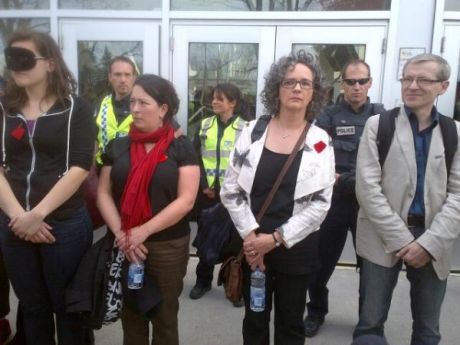News
You are here
"À qui l’UQO? À nous, l’UQO!"

April 17, 2012
The Université du Québec en Outaouais (UQO) was on red alert this week as students defied the court injunction imposed on the strike against a 75 per cent hike in Quebec tuition fees. The injunction orders students back to class, and criminalizes picketing or protests within 25 metres of both of UQO’s Gatineau campuses, Alexandre-Taché and Lucien-Brault. It marks a new stage in the government’s attempt to break the strike before the end of term.
On Monday April 16, students occupied the main building of UQO, and their professors formed a human chain to protect them. On Tuesday the 17, one professor was arrested and another physically expelled from the building. The arrested professor had been trying to retrieve belongings in the building and the one dragged out had been filming police.
Police were deployed inside and outside and students, professors, and supporters of the occupation were informed they were to be considered “intruders.”
A call went out for solidarity, and on the morning of April 18 dozens of supporters from different unions appeared at the Alexandre-Taché campus of UQO: the Canadian Union of Postal Workers, faculty unions, and the CSN—one of the two major trade union federations in Quebec, which had put out a call on April 17 for union locals to show visible support for the student strike in this crucial week.
On April 18, the decision was made to close UQO down for the day. The morning rally was joined by 100 students from the nearby CEGEP de l’Outaouais, who marched to UQO chanting: “C’est pas une injunction qui va nous faire plier: grève générale illimitée!” (“It’ll take more than an injunction to make us fold: unlimited general strike!”) The crowd did a triumphant march around the closed building, raising the slogan: “À qui l’UQO? À nous, l’UQO!” (“Whose UQO? Our UQO!”)
But later in the day, when 200 students and professors tried to march to UQO’s Lucien-Brault campus, accompanied by journalists, they faced riot police who kettled them on Lac des Fées parkway. Police confirmed 161 arrests, in addition to traffic tickets.
Similar tensions have occurred this week at the Université de Montréal, where 20 private special security agents were deployed on April 16 to intimidate striking students and faculty.
In May 1968, it was police occupations of universities in the Nanterre suburbs of Paris that helped turn ordinary student protests into a full-scale uprising and the occupation of the Sorbonne, with broad public support by those outraged by the repression of basic democratic rights.
As an elderly local supporter at the UQO rally put it: “In Europe, the university is a sacred space, like a church: the police dare not enter.” Outrage over the crack-down by Quebec courts and police may well increase support for the strike.
Section:
Topics:
- Log in to post comments









